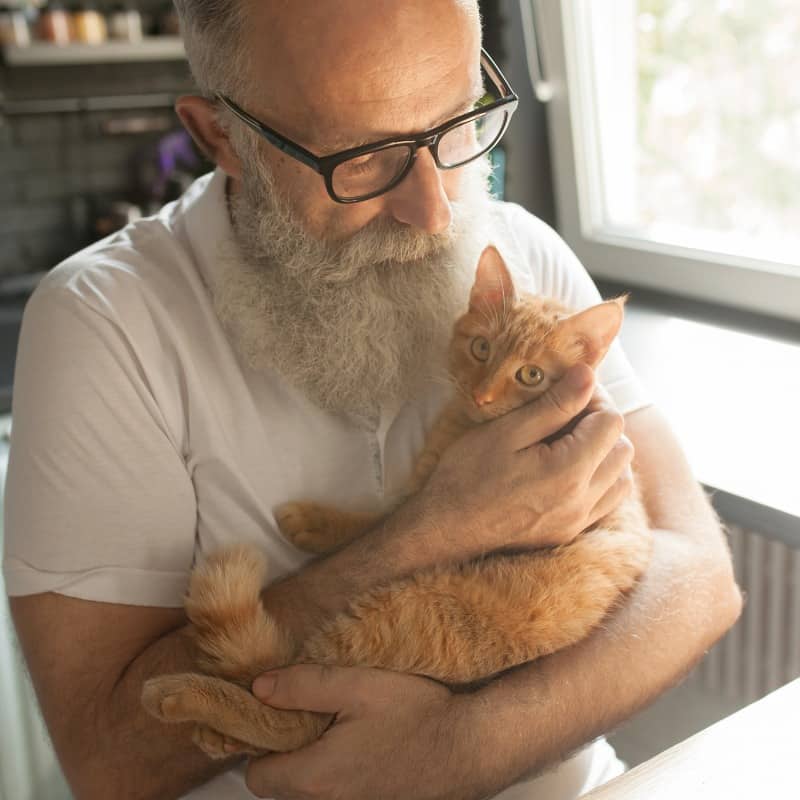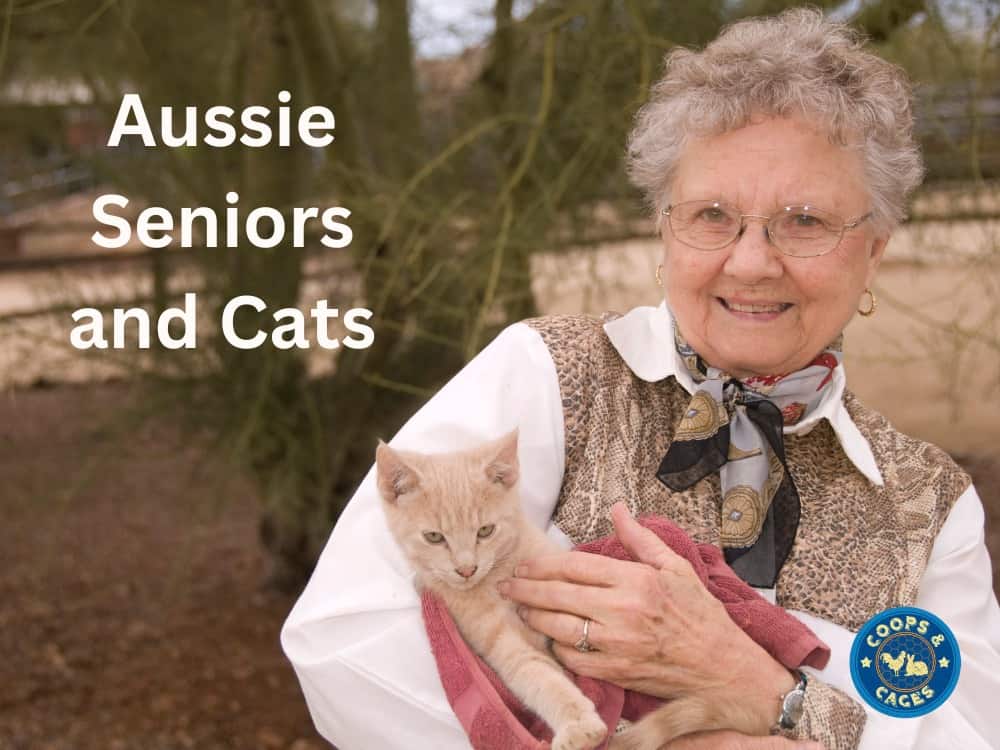There’s something truly special about the bond between seniors and cats.
Cats offer a unique form of companionship that can significantly improve the quality of life for older folks.
Independent yet affectionate, cats are perfect for those who may not have the energy or mobility to care for more demanding pets.
In this blog post, we will explore the benefits and challenges of owning a cat for seniors, as well as some handy tips for caring for cats in later life.
So whether you are an older person thinking about getting a cat for the first time or are a seasoned cat owner, read on for some helpful information about seniors and cats.
Benefits of Owning a Cat for Seniors
The gentle physical activity involved in caring for family pets helps to maintain the overall health and wellbeing of seniors.
Emotional Wellbeing
Cats provide social interaction that can be especially beneficial to senior citizens, who may live alone. Research has shown pet ownership reduces stress levels, promotes relaxation and enhances mood – all contributing positively towards mental health.
Routine and Purpose
Apart from loveable companionship, owning a cat gives people something meaningful to focus on in their senior years.
Preparing meals at specific times or scheduling regular play sessions brings structure into retirement years where there might otherwise be less routine. Purposeful daily engagement with a cat helps keep cognitive functions sharp.
Physical Health
Feeding, grooming, playing – all these tasks encourage movement without being overly strenuous. The purring vibration of a contented cat is soothing but did you know it releases endorphins in humans?
These feel-good hormones reduce stress and lower blood pressure.
Challenges of Owning a Cat for Seniors
Cats are independent and low-maintenance, making them great companions for seniors. However, there can be some challenges.
Cleaning the Litter Box
Regularly cleaning the litter box can be physically demanding, especially for seniors who may have mobility issues or arthritis.
Self-cleaning litter boxes are now available that simplify the process greatly by automatically removing waste into a sealed compartment which helps control odour too.
Cost of Care
The true cost of cat ownership includes vet visits. Checkups, vaccinations and flea treatments are all regular expenses. If your cat develops health issues or dental problems, you may also need to pay for expensive veterinary care treatments or procedures.
If your cat develops chronic kidney disease or weight issues, there may also be an added cost of special dietary foods. This can be difficult for seniors living on fixed incomes. Consider getting pet insurance to save you money in the long run.
Activity Levels
Although cats value their independence, they still crave social interaction and stimulation. Regular playtime and exercise are crucial not only for their happiness but also to prevent boredom-induced behaviours such as scratching furniture or over-grooming.
If seniors have limited mobility or energy levels, they should adopt older cats. Kittens may be too active and overwhelming for older people. Also, consider buying interactive cat play things designed to provide entertainment without requiring much effort from humans.

Handy Tips for Seniors Caring for Cats
The bond between a human and their cat is particularly important as we age. Here are some useful ideas for seniors caring for a pet cat:
Cat Enclosures
Indoor cats can feel cooped up living inside your house full time. But letting them roam outside puts them at risk of getting lost or injured. An outdoor cat enclosure is a safe haven for cats, allowing them the joy of sitting outside in the sun without the risk of wandering too far.
Coops and Cages offer cat enclosures in various sizes, to suit every yard. Our Stacey enclosure is great for small yards as it has a small footprint but is very tall. This allows your cat plenty of room to jump up high and explore.
Diet and Nutrition
You may have to feed your cat a special diet if it suffers from common problems such as diarrhea, dental disease, urinary tract infections, kidney disease, pancreatitis or allergies.
This may be a short-term change or a permanent diet guideline. If your adult cat is overweight, you will need to feed it a low-calorie diet to help with weight loss.
If you’re unsure what type of food would be best suited to your kitty’s diet, ask your vet who can give advice based on breed, weight, activity level, and any existing medical conditions.
Evaluating Seniors’ Abilities
If you’re considering adopting a feline companion for an elderly loved one, make sure to first evaluate if they are capable of handling the responsibilities associated with cat care.
This includes assessing their memory, ability to learn new skills and comfort with lifestyle changes. Make sure the senior is able to physically care for a cat without risking injury to themselves through falls.
Older pets may be better suited to older people. An active kitten might be too much for someone with mobility issues, while an elderly cat could offer quiet companionship without requiring constant playtime.
Choosing the Right Cat
Selecting the right cat breed is another key factor in ensuring compatibility between a senior and their new pet. Some breeds are known for being calm and low-maintenance while others require more attention or grooming.
Also, consider the size of the cat. Some breeds are very big and heavy, making them difficult for seniors to lift. Adopting elderly cats from shelters gives you the opportunity to interact with the cat before committing to it.
You can assess its temperament and activity levels, helping you decide if it suits your senior’s situation.
FAQs in Relation to Seniors and Cats
Should a 70-Year-Old Get A Cat?
Absolutely, as long as they’re physically capable and enthusiastic about pet care. Cats can provide companionship and emotional support for seniors.
Are Cats Good For Elderly People?
Yes, cats are often great companions for the elderly. They require less physical activity compared to dogs but still offer affection and companionship.
Is 70 Too Old To Get A Kitten?
No age is too old if you’re fit enough. However, consider the cats age! Kittens require more energy than older cats, so consider adopting an adult or senior cat instead.
Jordan’s Wrap
Owning a cat can be a rewarding experience for seniors, but it’s important to carefully consider the challenges and responsibilities involved. With the right planning, a cat can provide companionship, love, and support for many years to come.
If you are a senior considering getting a cat, I encourage you to do your research. With careful planning, cats can become family members too. At Coops and Cages, we’re dedicated to helping Aussie seniors and cats set up the perfect home together.
We offer quality cat enclosures, scratching posts, beds and cat food bowls at affordable prices.



